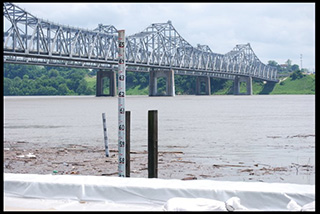As floodwaters move down the Mississippi River like an advancing army, all those fighting against it need up-to-date communications to keep from being plowed under by its enormity. On the front lines are the barge industry, Corps of Engineers, Coast Guard and National Weather Service.
“We have been briefing the barge industry on a daily basis, sometimes an hourly basis,” said Dr. Suzanne Van Cooten, a hydrologist with the NWS in Slidell, La., across Lake Pontchartrain from New Orleans. “They are a good partner, very knowledgeable. They are out there every day, and they bring a perspective that is extremely valuable.”
Water levels increase annually along the inland waterways system in the spring when snow melts run south. Obviously, said Van Cooten, this is different. “This is an early season event that is uncommon,” she said. “We work so hard with the industry because we’re part of the Department of Commerce, so shipping is very important to our economy. The barge industry went through a high water event in 2011 and a low water event in 2012. We all work together to try to minimize the damage.” (High water was also a problem, though to a lesser extent, along the system last year.)
The flooding will also be a long event. The river will crest at 43'6" at Baton Rouge, La., and south to Donaldson, La., on Jan. 20. South of there through New Orleans the river is expected to crest at only 17' thanks in part to the scheduled opening of the Bonnet Carré and Morganza spillways as soon as Saturday based on forecasted river stages. Some of the water from the spillways will dump into Lake Pontchartrain and the Atchafalaya River. “Morgan City [La.] won’t crest until Jan. 23, so that’s really the whole month for interests along the Atchafalaya,” said Van Cooten.
Whenever extreme conditions occur today, the words “climate change” become a part of the conversation. To blame this event on climate change is going too far out on a limb, said Mike Efferson, a meteorologist, also a part of the NWS’s Slidell office.
“You have different years with more rain than others. We have a strong El Niño and with that you get more rain than usual,” he said. “You can’t correlate one event with climate change. That’s like trying to correlate one strong hurricane with climate change. It doesn’t work.”




